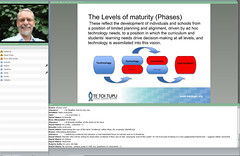 Image by hazelowendmc via Flickr
Image by hazelowendmc via FlickrRoss began the session by giving an overview of the purpose of the ELPF, in particular to help gather evidence of practice in schools, as well as a road map that can provide reference points, and help identify PLD needs for a school. There was emphasis made that this is not a tool for evaluating a school's performance. He then moved on to discuss the fact that the ELPF is in particular for leaders, who may or may not, be the principal of a school.
The next stage was for Ross to move into a description of the ELPF, which has:
- Levels which indicate eLearning maturity (phases);
- Dimensions and strands with clear outcomes or goals; and
- Descriptor statements.
 Image via Wikipedia
Image via WikipediaThe framework seeks to recognise the multi-faceted nature of eLearning maturity, and there are several dimensions to the ELPF: Leadership and strategic direction; Professional learning; Infrastructure and resourcing; Learning and Teaching; and Beyond the classroom. The descriptor statements indicate where a school or an individual might set on a continuum of eLearning maturity the four phases of which are currently entitled emerging, engaging, enabling, and empowering. The diagram below (sourced from Ross's presentation) illustrates the movement across phases as a school gains in eLearning maturity - in other words there is a distinct shift from a focus on the technology itself, to a curriculum focus. One of the overall goals of the project is to develop a resource of examples of effective practice and evidence that underpins each of the phases in the framework, making this a practical, user-friendly resource - especially if funding comes forward to ensure that this is online and interactive.

It was really interesting to hear about the process (long and rigorous) that is underlying the ELPF. The review of existing frameworks has avoided the obvious reinvention of the wheel, and a wide range have been utlised to inform the design process, including the UNESCO - ICT Competency Standards for Teachers; and e-Potential (Victoria, Australia). Alongside the process of drawing on existing frameworks, a panel of experts and focus groups have been consulted, and will continue to have input into the ELPF going forward.
 Image by simpologist via Flickr
Image by simpologist via FlickrThe timeframe for the ELPF going 'live' (after the completion of the consultation and feedback stage) and available for all schools is June 2012, although whether this will be online, as indicated above, remains to be seen. My feeling is it would seem a tad ironic to have an eLearning planning framework in a .pdf format that has to be printed off!!!
The session included some lively discussion around some of the underlying principles of the ELPF, as well as some of the wording and what that might refer to in practical terms. It was superb to have an opportunity to share ideas, observations, and concerns with a great community of educators, and also to hear some of the inspirational experiences they have encountered in learning experiences.
I would highly recommend accessing the recording if you are interested in any aspect of the ELPF by clicking this link: eLearning Capability Framework.
Formative Roadmap: The eLearning Capability Framework - Ross Alexander






No comments:
Post a Comment